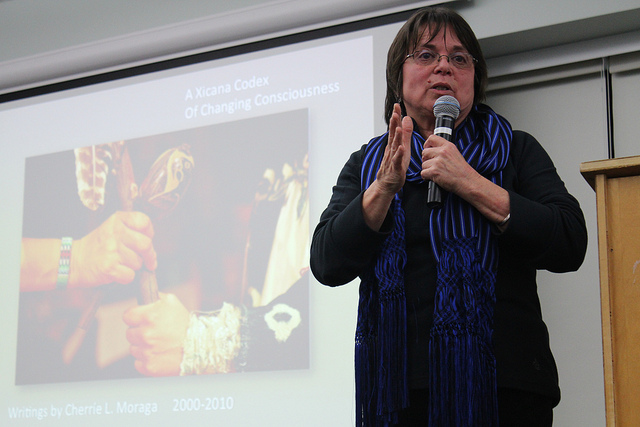Voices From the Past: Cherrie Moraga

 By Patricia Munoz, LIN@R
By Patricia Munoz, LIN@R
“Xicana, writer.” Cherrie Moraga said.
“I am a Xicana writer.”
On the matters of personal identity, many people tend to choose the most important title: Ph. D., Doctor, lawyer or politician. Other people, like Cherrie Moraga, lean toward their cultural roots; they invite challenges; and they take an “I am part of my history” attitude.
Meet Cherrie Moraga, a Xicana Writer.
Moraga visited Rutgers University in April as part of the Latino Literacy Imagination Residency Program — a long weekend packed with activities, presentations and a panel with many of the university’s faculty.
Born in California in a bicultural family (her mother was born in Mexico, her father in the United States) Moraga grew up admiring two strong women in her life, her mother and grandmother. Two voices that even today she can hear when she starts writing her stories.
“My mom was the mera, mera cuentista (the ultimate storyteller)”, Moraga said in an interview with LINAR during her visit to Rutgers. The irony of life is that her mother suffered from Alzheimer’s disease, and the challenge for Moraga was to bring back those moments, those voices, those “cuentos.”
Voices, memory, stories. That is what makes a Xicana Writer –like Cherrie Moraga.
Cherrie Moraga’s Work
Writer:
Moraga’s career includes receiving in 2007 the United States Artist Rockefeller Fellowship for Literature; in 2008, a Creative Work Fund Award, in 2009, a Gerbode-Hewlett Foundation Grant for Playwriting, according to her website.
Moraga is the co-editor of “This Bridge Called My Back: Writings by Radical Women of Color,” which won the Before Columbus American Book Award in 1986. She is the author of the now classic, “Loving in the War Years: Lo Que Nunca Pasó Por Sus Labios” (1983/2003) and “The Last Generation” (1993), published by South End Press of Cambridge, Massachusetts.
In 1997, she published a memoir on motherhood entitled “Waiting in the Wings” (Firebrand Books) and is completing a memoir on the subject of Mexican-American cultural amnesia entitled, “Send Them Flying Home: A Geography of Remembrance.”
This year Moraga also completed a new collection of writings — “A Xicana Codex of Changing Consciousness: Writings 2000-2010,” published by Duke University Press in 2011.
Plays/Theater
Moraga has also published three volumes of drama through West End Press of Albuquerque, New Mexico. They include: “Heroes and Saints and Other Plays” (1994), “Watsonville/Circle in the Dirt” (2002) and “The Hungry Woman” (2001).
In 2010, WEP will publish a volume of Moraga’s children’s plays, entitled “Warriors of the Spirit.” A San Francisco Bay Area playwright, Moraga has premiered her work at Theatre Artaud, Theatre Rhinoceros, the Eureka Theatre, and Brava Theater Center. Brava’s production of “Heroes and Saints” in 1992 received numerous awards for best original script, including the Drama-logue and Critic Circles Awards and the Pen West Award.
Her plays have been presented throughout the Southwest, as well as in Chicago, Seattle and New York. In 1995, “Heart of the Earth,” Moraga’s adaptation of the Popol Vuh, the Maya creation myth, opened at the Public Theatre and INTAR Theatre in New York City.
In 2005, “The Hungry Woman: A Mexican Medea” opened at The Pigott Theater at Stanford University, directed by Moraga and Adelina Anthony. In the years following, Moraga developed several new works, including: “Mathematics of Love,” “Digging Up the Dirt” and “La Semilla Caminante/The Traveling Seed.” “Semilla,” conceived and designed in collaboration with Alleluia Panis and Celia Herrera Rodriguez, opened in a workshop production with Campo Santo Theater of San Francisco in April 2010.
In July 2010, Moraga’s “Digging Up the Dirt” opened to a sold-out audiences during a five-week run at Breath of Fire Latina Theater in Orange County, California, in a co-production with See-what (Cihuat) Productions. Her most recent play, “New Fire — To Put Things Right Again,” was produced by Cihuatl Productions and Brava Theater in San Francisco in January 2011. A collaboration with Celia Herrera Rodriguez produced the winner of the Gerbode-Hewlett Foundations Playwright’s Award, a play witnessed by more than 3,000 people over its 12-day run.
Day Job
For more than 10 years, Moraga has served as an Artist in Residence in the Department of Drama at Stanford University and currently also shares a joint appointment with Comparative Studies in Race & Ethnicity. She teaches Creative Writing, Xicana-Indigenous Performance, Latino/Queer Performance, Indigenous Identity in Diaspora in the Arts and Playwriting.
She is a founding member of La Red Xicana Indígena, a network of Xicanas organized to effect social change through international exchange, indigenous political education, spiritual practice and grass roots organizing.
Watch the videos for the complete interview with Cherrie Moraga about identity, women’s activism, gay marriage and the importance of memories and role models.
Cherrie Moraga Talks About Identity
“Estamos Perdidos Sin Memoria”
Role Models
On Gay Marriage
Source: www.cherriemoraga.com
This article was first published in LIN@R.
[Photo by sffoghorn]

